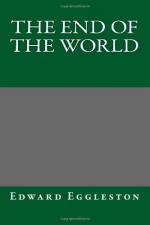CHAPTER XXXVI.
THE SIN OF SANCTIMONY.
Just at this point arrived Mr. Hall, whom I have before described as the good but callow Methodist preacher on the circuit. Some people think that a minister of the gospel should be exempt from criticism, ridicule, and military duty. But the manly minister takes his lot with the rest. Nothing could be more pernicious than making the foibles of a minister sacred. Doubtless Mr. Hall has long since come to laugh at his own early follies, his official sanctimoniousness, and all that; and why should not I, who have been a callow circuit-preacher myself in my day, laugh at my Brother Hall, for the good of his kind?
He had come to visit Sister Cynthy Ann, whose name had long stood on the class-book at Harden’s Cross-Roads as a good and acceptable member of the church in full connection. He was visiting formally and officially each family in which there was a member. Had he visited informally and unofficially, and like a man instead of like a minister, he would have done more good. But he came to Samuel Anderson’s, and informed Mrs. Anderson that he was visiting his members, and that as one of her household was a member, he would like to have a little religious conversation and prayer with the family. Would she please gather them together?
So Julia was called down-stairs, and Jonas was invited in from the kitchen. The sight of him distressed Brother Hall. For was not this New Light sent here by Satan to lead astray one of his flock? But, at least, he would labor faithfully with him.
He began with Mr. Samuel Anderson. But that worthy, after looking at his wife in vain for a cue, darted off about the trumpets of the Apocalypse.
“Mr. Anderson, as head of this family, your responsibility is very great. Do you feel the full assurance, my brother?” asked Mr. Hall.
“Yes,” said Mr. Anderson, “I am standing with my lamp trimmed and ready. I am listening for the midnight shout. To-night the trumpet may sound. I am afraid you don’t do your duty, or you would lift up your voice. The tune and times and a half are almost out.”
Mr. Hall was a little dashed at this. A man whose religious conversation is of a set and conventional type, is always shocked and jostled when he is thrown from the track. And he himself, like everybody else, had felt the Adventist infection, and did not want to commit himself. So he turned to Mrs. Anderson. She answered like a seraph every question put to her—the conventional questions never pierce the armor of a hypocrite or startle the conscience of a self-deceiver. Mr. Hall congratulated her in his most official tone (a compound of authority, awfulness, and sanctity) on her deep experience of the things that made for her everlasting peace. He told her that people of her high attainments must beware of spiritual pride. And Mrs. Anderson took the warning with beautiful meekness, sinking into forty fathoms of undisguised and rather ostentatious humility, heaving solemn sighs in token of self-reproach—a self-reproach that did not penetrate the cuticle.




